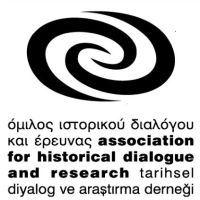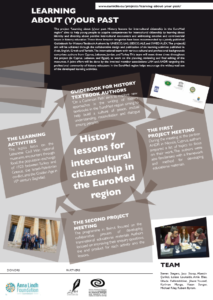History lessons for intercultural citizenship in the Euro-med region
The project “Learning about (y)our past. History lessons for intercultural citizenship in the EuroMed region” aims to help young people in the EuroMediterranean region to acquire competences for intercultural citizenship by learning about identity and diversity, about positive intercultural encounters and addressing emotive and controversial issues in history education. The project will achieve this through collaborative design, piloting, peerreview, editing, design and publication of six learning activities that can be used as alternative educational resources. The development of these resources will be done by an international team with various cultural and professional backgrounds. This team will meet three times throughout the project, to work on the initial planning, peerreview and final editing of the resources. In between meetings the project team will work on the collecting of source material and piloting of the resources in practice. The project meetings will take place in Cyprus and Lebanon. The learning activities will be translated and published in Arab, English, Greek and Turkish and made freely available for use on the website of EuroClio and licensed in such a way that reuse is possible. To ensure that the main relevant stakeholders are informed about the learning activities and encourage its widespread use the project team will develop and implement a communication plan targeting the professional community of history educators in the EuroMed.
Project Aims
The overall objective is to help young people in the EuroMediterranean region to acquire competences for intercultural citizenship by learning about identity and diversity, about positive intercultural encounters and addressing emotive and controversial issues in history education. More specific objectives are:
- To build the professional capacity and extend the networks of history, heritage and citizenship educators in the EuroMed region that is supporting the idea that history education can contribute to intercultural citizenship education.
- To build, provide access to and promote the use of learner centered, sourcebased, and multiperspective educational materials in the EuroMed region in Arabic, English, Greek and/or Turkish.
- To engage in joint advocacy to inter-governmental organizations and targeted media on regional and global levels, raising awareness amongst policy makers and civil society actors on the importance of responsible history education in the EuroMed region.
Supported by

Partners
![[LEBANON] HTA](https://euroclio.eu/wp-content/uploads/2016/09/LEBANON-HTA-261x300.jpg)

Educational Resources
All educational resources are available in .zip format below, in Arabic, English, Greek, and Turkish. Each .zip file contains teacher instructions, student instructions, and worksheets.
| Title | Author | English | ελληνικά | Türkçe | العربية |
| How do museums display y(our) history and identity? A case study on Cyprus. | Alaettin Carikci | English | ελληνικά | Türkçe | العربية |
| “No place like home”: How did the events of 1923 change people’s lives in Turkey and Greece? | Hasan Sungur | English | ελληνικά | Türkçe | العربية |
| How did the Lebanese Civil War (1975-1990) change people’s lives? | Jihane Youssef Francis | English | ελληνικά | Türkçe | العربية |
| What made Baghdad so remarkable 764-1258CE? | Kariman Mango | English | ελληνικά | Türkçe | العربية |
| What can food reveal about societies in the past? Encounters through food and ceremonies of food in the Euro-Mediterranean region from the 10th century until today. | Loizos Loukaidis | English | ελληνικά | Türkçe | العربية |
Project team
Alaettin Çarikci, coordinator and author AHDR (Cyprus)
Loizos Loukaidis, coordinator and author AHDR (Cyprus)
Amin Elias, coordinator LAH (Lebanon)
Ghada Fakhredddine, author LAH (Lebanon)
Jihane Youssef, author LAH (Lebanon)
Kariman Mango, author (Jordan)
Hasan Sungur, author (Turkey)

